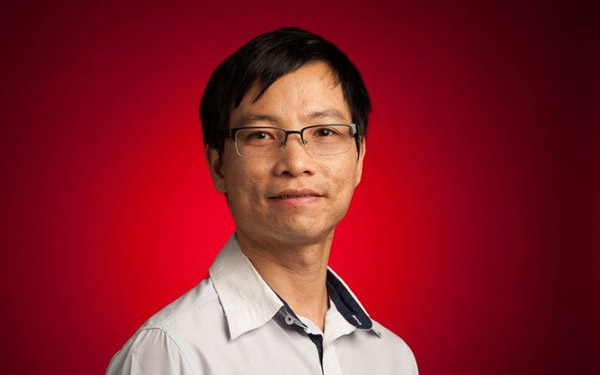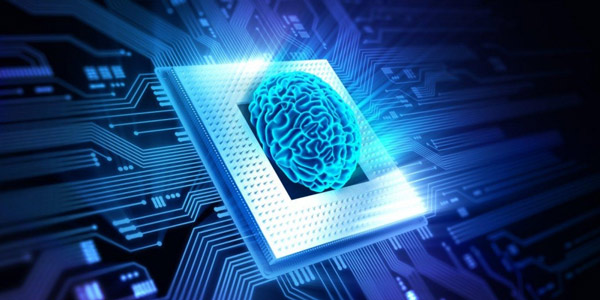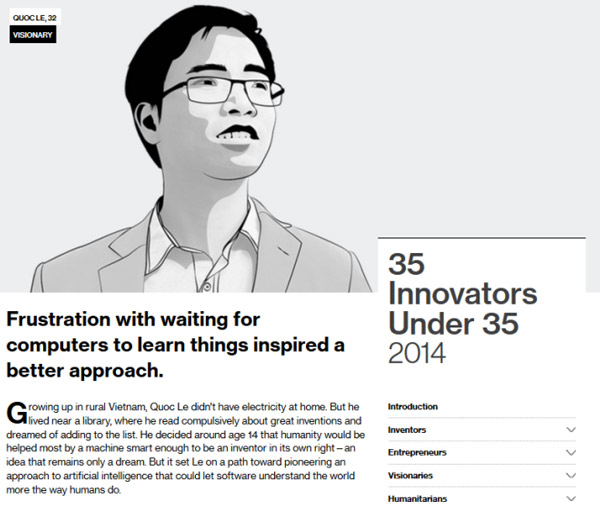Le Viet Quoc, a young Vietnamese engineer who holds Google's brain
Le Viet Quoc is also known as "Google Brain" is an important figure in the field of artificial intelligence (AI) of Google.
Le Viet Quoc was born in 1982 in a small village in Huong Thuy, Thua Thien-Hue province. As a child, Quoc often went to the library near his home to read books about great inventions and dreams of possible inventions of his own in the future.
After graduating from the Hue College of National Studies, thanks to excellent academic achievement, Viet Quoc received a full scholarship and attended the Australian National University.

In 2007, Viet began to work as a PhD student at Stanford University, USA on artificial intelligence. Here, the Vietnamese engineer has found a way to speed up data processing with thousands of times greater.
In 2011, Le Viet Quoc joined three other talented scientists (including Google graduate student Jeff Dean, researcher Greg Corrado working at Google and advisor Dr. Andrew Ng) who founded Google Brain. The goal of Google Brain is to study Unsupervised Deep Learning on the basis of Google's massive data volume.
Deep Learning can be applied in many disciplines to help solve a variety of issues such as education, climate change .
To better understand Deep Learning, you can refer to the article "The difference between AI, machine learning and deep learning".
In 2012, Viet Quoc announced the successful development of an intensive neurone network model. This network can recognize cats based on 10 million digital images from YouTube, as well as more than 3,000 photos in the ImageNet data set.

This team's success has opened a new race of deep learning technology Deep Learning at leading technology firms.
After graduating in 2013, Quoc officially joined Google as a researcher. Here, Viet Quoc quickly gained admirable achievements in machine translation (Machine Translation), one of the most dynamic research areas in Machine Learning community.
In 2014, Quoc proposed and together with other researchers in Google to complete the sequence of sequences (Seq2seq) learning, a framework of tools - a library of code decoding codes to train tissues image to convert strings from one domain to another.
After that, Quoc continued to invent Doc2vec - the extension of Word2vec, introduced in 2013. Doc2vec is applied in displaying fixed-length content.
In 2015, Quoc was selected by the MIT Technology Review (MIT Technology Review) as a "Innovators Under 35" in the Visionaries category, for the purpose of "making the software smart enough to helping to make people's daily life more comfortable ".

In 2016, based on the success of the research of Viet Quoc, Google announced the neurone translation system (Neural Machine Translation System) using AI can create better and more natural translations.
Also in 2016, Viet Quoc and Dr. Barret Zoph, another Google researcher, proposed a search system for neurone architecture that could help researchers find exactly the right network architecture. with the most artificial structure. A year later, the two researchers again proposed NASNet-A, a convertible structure for large-scale image data sets. This research is the foundation for Google to develop AutoML, a set of products designed for developers with machine learning expertise and limited resources.
- AutoML - Google's AI can outperform its creators
- Google's artificial intelligence "gives birth to itself", potentially far beyond human-written software
Earlier this year, Google launched AutoML Vision. And last month, Google also released natural translation and language tools at its Cloud Next conference.
Currently, Le Viet Quoc is the project manager of Google Brain, a research group of about 25 people responsible for researching about 5-6 revolutionary projects in the field of AI.
Viet Quoc is the one who contributed significantly to the development of Google's translation tool - Google Translate, an unbelievable utility product for users.
See more:
- Life Paul Allen, who dragged Bill Gates away from Harvard, founded Microsoft
- This is the duo that helped Google escape the disaster at the worst time and together changed the Internet history
- The story of "double bearer" Sabu: Anonymous traitor, the hero of the FBI
You should read it
- ★ AutoML - Google's AI can outperform its creators
- ★ Google researchers for gaming AI to improve enhanced learning ability
- ★ AI engineer Facebook talks about deep learning, new programming languages and hardware for artificial intelligence
- ★ What is machine learning? What is deep learning? Difference between AI, machine learning and deep learning
- ★ The difference between AI, machine learning and deep learning